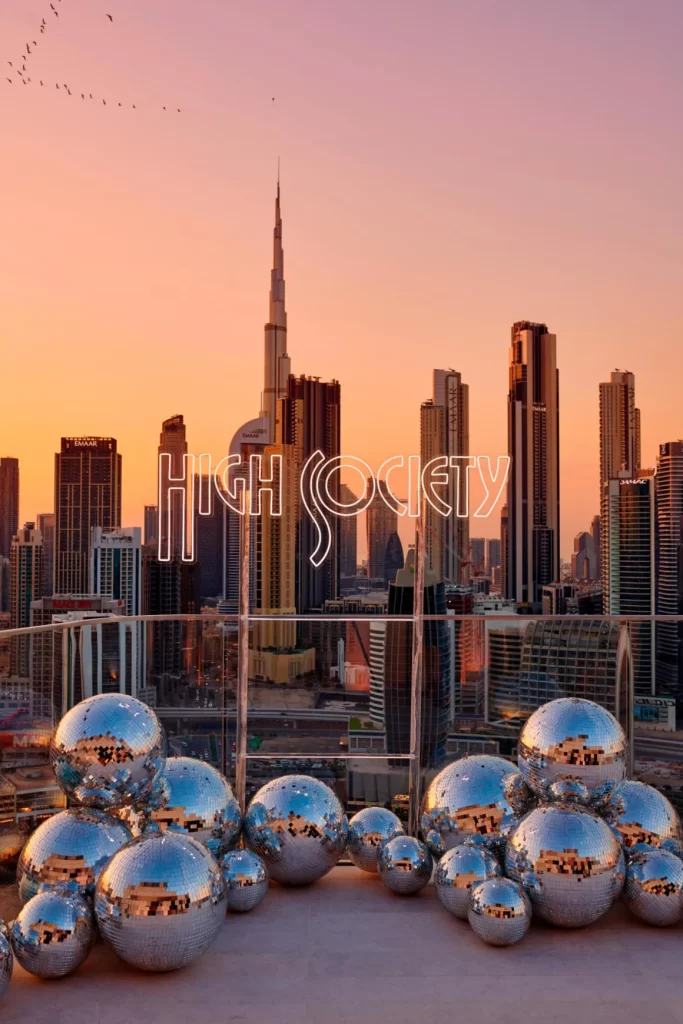News
Dubai’s Champagne Revolution: Transforming the Bar Scene with Artisanal Elegance
In the radiant expanse of Dubai’s ever-evolving bar scene, a champagne revolution is unfurling, transforming the city’s drinking culture into an oasis of refinement. The focal point of this effervescent transformation is High Society, a newly minted bar on the 30th floor of The Lana, the inaugural hotel from the prestigious Dorchester Collection in Dubai. Here, a sophisticated clientele indulges in the opulence of champagne while casting their gaze upon the glittering skyscrapers of the City of Gold, silhouetted against the dusky dunes beyond. Let’s find out with nowglas.

High Society, a concept meticulously curated by Nicolas Caupain, the hotel’s Director of Food and Beverage, aspires to redefine Dubai’s relationship with champagne. In a city where alcohol consumption is intricately regulated due to its Islamic roots, Caupain envisions champagne not merely as a libation reserved for celebrations but as an everyday pleasure, accessible to all. This innovative approach marks a departure from conventional norms, illustrating Dubai’s embrace of diversity and sophistication in its burgeoning tourism and hospitality sectors.
Dubai, renowned for its Michelin fine dining, pulsating nightclubs, and indulgent boozy brunches, has seen a noticeable void in its bar scene. Venues that emphasize the design and diversity of their drinks menus have been scarce. However, Caupain is unwavering in his belief that “there is a market in Dubai looking for this level of refinement and discovery.” High Society emerges as a trailblazer, steering the city towards a more casual and diverse drinking culture.

Champagne, with its intricate production process involving a second fermentation in the bottle, offers a myriad of flavor profiles. High Society proudly boasts an extensive collection of 118 labels, positioning itself as one of the largest champagne repositories in the UAE. The selection spans illustrious champagne houses like Pol Roger, known as the favored champagne of luminaries such as Queen Elizabeth II and Winston Churchill, to the relatively obscure “grower champagnes” like Egly Ouriet, Larmandier Bernier, and Ulysse Collin.
The surge in popularity of these artisanal labels is not confined to Dubai; it resonates globally. Samuel Lacroix, the Wine Director at Al Muntaha, a Michelin-starred European fine-dining restaurant at the iconic Burj Al Arab hotel, notes that smaller labels produce exclusive and delectable champagnes, contributing to the evolving preferences of Dubai’s changing demographic. An influx of business elites and professionals, drawn by the allure of the Emirate’s golden visa, is propelling the city’s food and beverage scene to compete with other international metropolises. The clientele is becoming more discerning and refined, seeking unique experiences that go beyond the conventional.
While the UAE already dominates the region for its wine selection, the focus has traditionally been on big champagne houses due to the convenience of bulk procurement. However, the influx of world-class sommeliers and chefs is redirecting preferences towards unique and exclusive products. Dubai’s foray into the “big leagues in the champagne world” is evident as it embraces a more diverse and nuanced approach to wine culture.

Dubai’s evolving palate is not confined to standalone venues like High Society. Restaurants such as Josette, a French establishment that opened its doors in 2023 and serves its private-label champagne, and BOCA, the recipient of the 2023 Green Michelin Star, with its list of organic, biodynamic, or eco-conscious sparkling wines, contribute to the surge in demand for unusual wines and champagnes. Even Emirates, the national airline, aligns itself with Dubai’s penchant for fizz, claiming to purchase more champagne than any other airline globally.
Award bodies are taking notice of Dubai’s growing prominence in the culinary and wine landscape. Gault&Millau, a French dining guide, opened its UAE office in Dubai in 2022, launching the UAE Champagne Index the same year. Just last month, Star Wine List, a Swedish publication, launched its inaugural awards for the UAE. The majority of winners and nominees in both awards hail from Dubai, further solidifying its position on the global stage.
However, Dubai’s bar scene faces challenges rooted in its history of alcohol prohibition. With only two wine suppliers in the city and a 50% customs duty on alcohol, many venues grapple with storage conditions, especially for fine wines and champagnes. Storing wine incorrectly in Dubai’s year-round heat could potentially damage the stock, posing a significant challenge for smaller or independent establishments.
Fu Bao’s Farewell: A Heartfelt Journey from South Korea to China
The culture around drinking in Dubai has traditionally centered on dining or special occasions, with little emphasis on casual or social drinking. Krister Bengtsson, founder of Star Wine List, notes that Dubai lacks a relaxed setting for sharing wine outside of formal dining or celebratory events. In cities like Paris, London, or New York, wine bars thrive as vibrant social spaces. Bengtsson suggests that new venues like High Society could play a pivotal role in fostering a “casual wine culture” in Dubai, creating an environment where patrons savor wines and champagnes in a more laid-back atmosphere.
In conclusion, Dubai’s journey into the realms of artisanal champagne marks a paradigm shift in the city’s approach to refined drinking experiences. High Society and analogous establishments are sculpting a new era for Dubai’s bar scene, challenging traditional norms and fostering a culture where the pleasure of champagne transcends celebratory moments, becoming a lifestyle destination for all occasions. As Dubai continues to captivate the world with its opulence, the evolution of its palate and refined preferences signals a promising trajectory for the city’s burgeoning wine and champagne culture, cementing its status as a global hub for sophisticated indulgence.
See more: Greek Lesbian Couple Celebrates Historic Wedding Amidst Cheers and Tears

